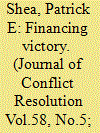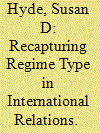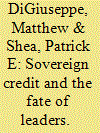|
|
|
Sort Order |
|
|
|
Items / Page
|
|
|
|
|
|
|
| Srl | Item |
| 1 |
ID:
133713


|
|
|
|
|
| Publication |
2014.
|
| Summary/Abstract |
With access to inexpensive credit, states can finance wars without overburdening their constituents, and face relatively small short-term costs compared to states with poor credit access. As a result of these economic benefits, states with lower credit costs will be more likely to win their wars, ceteris paribus. However, lower borrowing costs provide states domestic political benefits, which I argue are more important for democracies than nondemocracies. Since expensive credit forces states to rely on its citizens for revenue, governments that are more sensitive to their citizens' preferences are at a disadvantage. In sum, I argue that democracies are more sensitive to credit costs than authoritarian regimes. To test this theory, this article analyzes a data set of wars using logistic regressions and matching techniques, and examines the case of the Chaco War. The results demonstrate that the costs of borrowing have a substantial effect on war outcomes, and that these costs are more important for democracies than nondemocracies.
|
|
|
|
|
|
|
|
|
|
|
|
|
|
|
|
| 2 |
ID:
172846


|
|
|
|
|
| Summary/Abstract |
A wave of recent research challenges the role of regime type in international relations. One striking takeaway is that democratic and autocratic leaders can often achieve similar levels of domestic constraint, which in many issue areas results in similar international outcomes—leading many to question traditional views of democracies as distinctive in their international relations. In this review essay, we use recent contributions in the field to build what we call a “malleable constraints” framework, in which all governments have an institutionally defined default level of domestic audience constraint that is generally higher in democracies, but leaders maintain some agency within these institutions and can strategically increase their exposure to or insulation from this constraint. Using this framework, we argue that regime type is still a crucial differentiator in international affairs even if, as recent studies suggest, democratic and autocratic leaders can sometimes be similarly constrained by domestic audiences and thus achieve similar international outcomes. This framework helps reconcile many competing claims in recent scholarship, including the puzzle of why autocracies do not strategically increase domestic audience constraint more often. Just because autocracies can engage audience constraints and democracies can escape them does not mean that they can do so with equal ease, frequency, or risk.
|
|
|
|
|
|
|
|
|
|
|
|
|
|
|
|
| 3 |
ID:
141853


|
|
|
|
|
| Summary/Abstract |
In this article, we contend that the “democratic advantage” literature (i) exaggerates the potential political backlash from credit downgrades in democracies; and (ii) overlooks the importance of sovereign credit to nondemocratic leaders. We argue that nondemocratic regimes receive a higher marginal political benefit from credit compared to democratic regimes. Consequently, changes in credit prices or credit access affect nondemocratic leaders' tenure more than democratic leaders' tenure. To test this argument, we provide the first statistical examination of the electoral punishment mechanism of the “democratic advantage.” Our duration analysis shows that credit downgrades increase nondemocratic leaders' vulnerability more than that of their democratic peers. Our research reinforces the growing concerns about the conventional views about regime type, domestic constraints, and leaders' preferences toward sovereign credit and other political processes.
|
|
|
|
|
|
|
|
|
|
|
|
|
|
|
|
| 4 |
ID:
115316


|
|
|
|
|
|
|
|